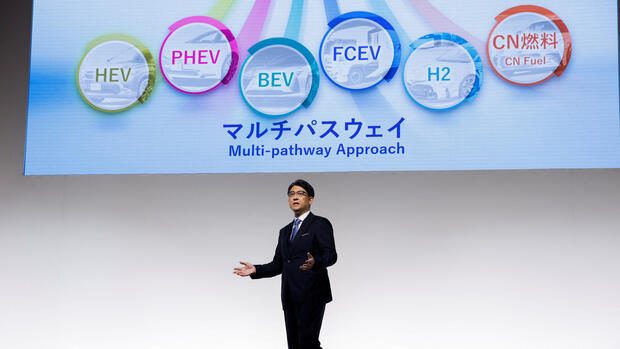Tokyo The Japanese carmaker Toyota wants to drastically increase the production of electric cars without neglecting other drives such as internal combustion engines and fuel cells. That is the message from the new Toyota boss Koji Sato, who presented his strategy on Friday.
In addition, Sato wants to launch an electric car on a new platform with a new battery in 2026, which will double the range with roughly the same size. This is expected to be a solid-state battery with a significantly higher energy density than previous liquid-electrolyte lithium-ion batteries.
The plans were not well received by investors. After the presentation began, the share price fell 0.4 percent to 1,820 yen. For Toyota, the course of the new leadership means a deep turning point. After 13 years, the 66-year-old Akio Toyoda surprisingly handed over the family inheritance to Sato, then head of the premium brand Lexus.
Why Toyota is lagging behind when it comes to electric cars
Toyoda himself retired to the post of CEO. In January, he justified the step by saying that he had reached his “limits” when converting the car manufacturer into a mobility group. “I expect Sato and his team to push the boundaries that I have not been able to push.”
Toyoda was addressing a strategic decision that has downgraded the world market leader in hybrid drives for BEVs to a runner-up. For years, Toyota’s electrification strategy focused more on hybrid drives than purely electric cars, while manufacturers such as Tesla or the world’s largest electric car manufacturer BYD from China concentrated on BEVs.
To some extent, this still pays off financially today. In 2022, Toyota was the only manufacturer in the world to deliver more than ten million vehicles. The operating profit margin was 9.8 percent in the first quarter, a very good figure for a large-scale manufacturer. In the electric car segment, which is growing strongly in some key markets, the carmaker has so far only been represented with two BEV models.
>> Also read: Toyota posts solid quarterly profit
This threatens to take revenge – not only in the industrialized countries. “Toyota will have a hard time achieving its goals,” says Chris Richter, auto analyst at broker CLSA in Tokyo. The small domestic electric car market is dominated by Renault partner Nissan, which, in addition to two BEVs, also launched a 14,000-euro mini-BEV, the Sakura developed with Mitsubishi Motors, onto the market last year. Since this year, BYD has also been more present than Toyota with more BEV models.
Toyota doesn’t just want to rely on electric cars
Koji Endo, head of the analysis department at SBI Securities, even fears for the supremacy of the Japanese in Southeast Asia after visiting a motor show in Thailand. “After seeing the auto show, I think that could change quickly in the next five years.” The reason: “I was shocked that BYD from China had the largest booth.” During his last visit before the Corona Pandemic would still have dominated the auto show in Bangkok, Toyota and the other Japanese. And now several Chinese manufacturers are already building BEV factories in Thailand, which they can use to open up the whole of Southeast Asia.
The world’s largest electric car manufacturer BYD from China is on an expansion course.
(Photo: Reuters)
The new Toyota boss does not want to give up the market without a fight. A new department takes care of the development of pure BEVs and new processes that are intended to halve development times and investments. But for Sato and his management team, the message from the market is not just to focus on electric cars and new services. He also wants to further develop internal combustion engines, engines that burn hydrogen, and of course – for heavy goods vehicles – fuel cells that generate electricity from the fusion of water and oxygen.
The enemy is carbon dioxide, not the type of propulsion. “The most important question is therefore how we can reduce emissions worldwide.” This requires a “realistic approach”, says Sato. Because in many countries, the electricity often comes only to a small extent from renewable energies. And Toyota doesn’t want to leave customers behind.
>> Read also: Why Tesla is suddenly shying away from silicon carbide
Analysts can get more out of the multi-pronged approach than investors. Of course, electric car offensives should now have priority, says Richter. “But it’s good to spread the eggs over several baskets.” For him, rising commodity prices or political changes pose risks for electric cars. But he calls for a quick reaction. And Sato wants to deliver that by making management more flexible and faster. His conclusion: “I believe that action, speed and a strong will will change the future”.
More: With plug and solar roof – Toyota brings the Prius back to Germany
